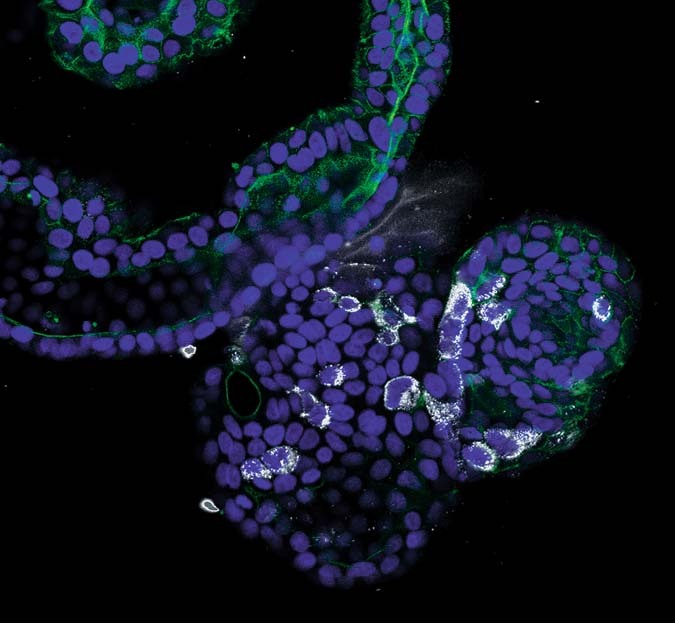A new study published in Science has used human small intestinal organoids (hSIOs) to support clinical evidence that suggests severe acute respiratory syndrome coronavirus 2 (SARS-CoV-2) can infect and replicate in the intestinal epithelium.
Although respiratory symptoms dominate the clinical presentation of coronavirus disease 2019, many reports exist of gastrointestinal symptoms in some patients, leading to speculation that the intestine might represent a viral target organ. Indeed, peak expression of the SARS-CoV-2 receptor, ACE2, is thought to occur in intestinal enterocytes.

Confocal microscopy image of a human intestinal organoid 60 h following infection with SARS-CoV-2. Actin filaments are stained green, nuclei are blue and the virus is white. Image courtesy of J. Beumer.
“The Clevers lab has been optimizing hSIO cultures and their differentiation into all mature lineages,” explains author Joep Beumer. “We had already identified the best conditions to achieve high ACE2-expressing enterocytes in culture. Therefore, we set out on this collaborative effort to use organoids to show that SARS-CoV-2 viral replication can occur in these cells.”
The investigators used hSIOs derived from primary gut epithelial stem cells, which were exposed to SARS-CoV-2 under different conditions. “To determine which cells were infected, we visualized viral antigens and host lineage markers using confocal microscopy. Infection at an ultrastructural level could be followed using transmission electron microscopy,” says Beumer.
This approach showed that enterocytes were readily infected by SARS-CoV-2 with substantial titres of infectious viral particles detected in all conditions tested. “These experiments proved that SARS-CoV-2 can productively infect cells of the intestinal epithelium,” says Beumer, but whether this finding has a role in SARS-CoV-2 transmission needs further investigation. The team also sequenced mRNA to examine the host response to the virus, finding that infection induced upregulation of genes attributed to antiviral type I and III interferon responses.
“Our goal is to set up relevant models to improve our fundamental understanding of coronaviruses, which could lead to the rational design of antiviral therapies,” concludes Beumer. “We also plan to construct a biobank of genetically modified organoids using CRISPR–Cas9 that we hope could aid in the understanding of viral entry and the epithelial response to it.”
These findings were confirmed in a second study published in Nature Medicine. This study also provided evidence of active SARS-CoV-2 replication in human intestinal organoids, as well as upregulation of type III interferon responses.
References
Original article
- Lamers MM, et al. SARS-CoV-2 productively infects human gut enterocytes. Science. 2020 doi: 10.1126/science.abc1669. [DOI] [PMC free article] [PubMed] [Google Scholar]
Related article
- Zhou J, et al. Infection of bat and human intestinal organoids by SARS-CoV-2. Nat. Med. 2020 doi: 10.1038/s41591-020-0912-6. [DOI] [PubMed] [Google Scholar]


